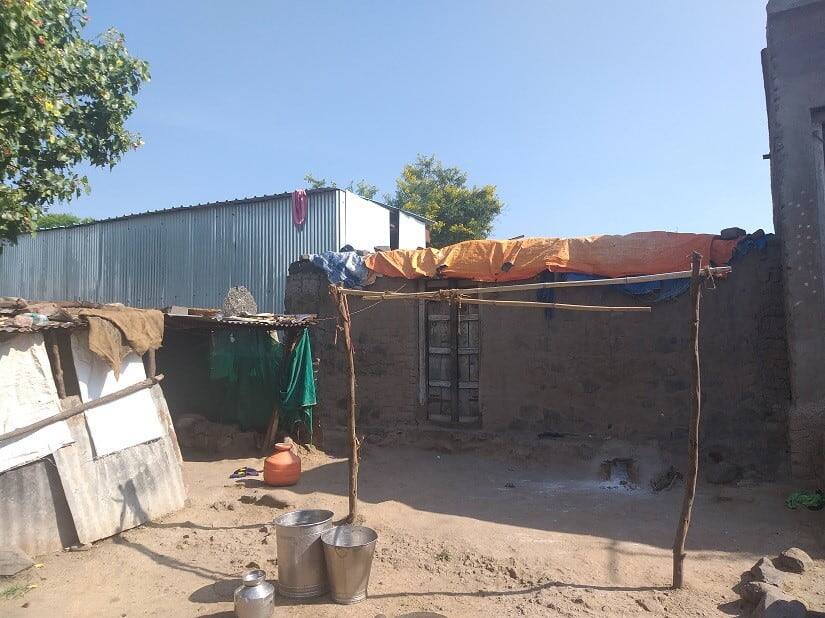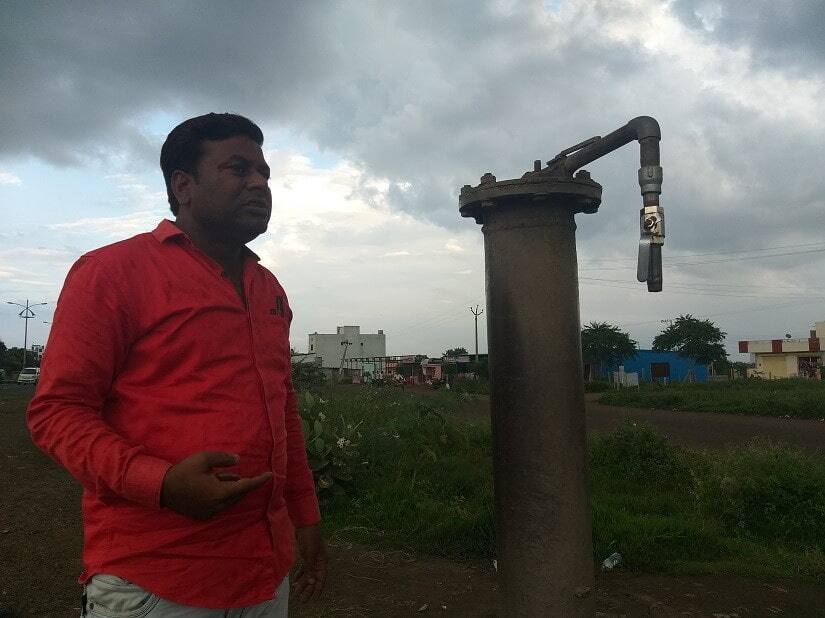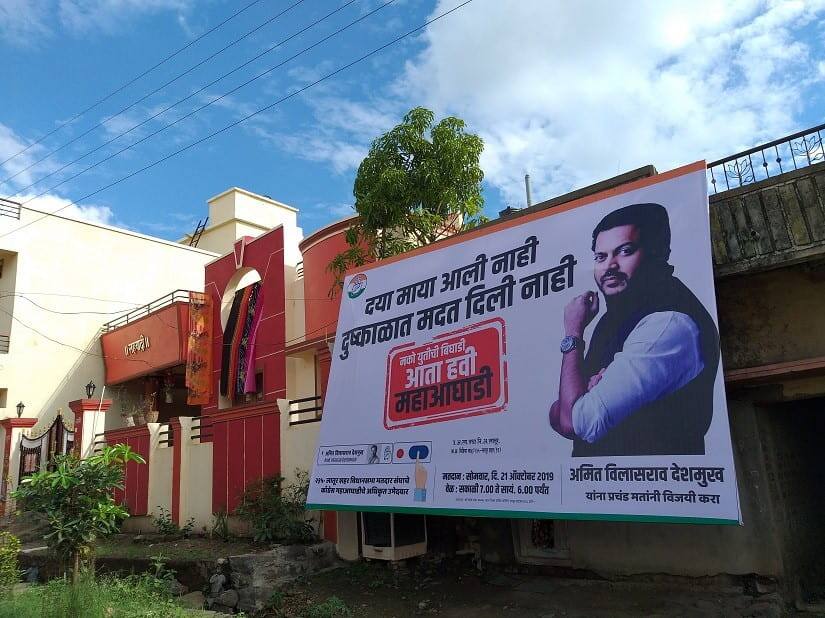The severity of drought in Maharashtra’s Beed and Latur districts, three years after the
Jaldoot Express carried 25 lakh litres of water into the parched Marathwada region, continues to be grim and could prove to be a matter of reckoning for the BJP-Shiv Sena government in the 21 October Assembly election. From the Bhil tribe in Beed resolving to withhold their votes because of the lack of tangible drought-alleviation policies, to a population of 15,000 in Latur’s Pakharsanghvi village relying on a ’leakage’ in a water pipeline for their daily needs - people have all but given up on the hope of receiving assistance from the administration in dealing with the
protracted crisis. Beed “We will not vote this time, no matter what happens,” Brahmagaon’s Alka Barde says with a steely resolve, adding, “There are at least 500 voters of the Bhil community in this village and we have taken this decision together.” The reasons for this decision are varied — the scarcity of water, youth being forced to migrate in search of labour on sugarcane farms in other states, and the
failure of the Awas Yojana in reaching the hamlet, dominate the discourse around the upcoming election. [caption id=“attachment_7525611” align=“alignnone” width=“825”] Alka Barde (left) and Tarabai Mali in Beed’s Brahmagaon say the Bhil community has decided not to vote in the upcoming Assembly elections. Firstpost/Natasha Trivedi[/caption]
Acute water scarcity has affected almost every aspect of life for the Bhil community living in the Brahmagaon, Thetegavan, and Khalvat Nimgaon hamlets in the Wadwani and Ashti talukas. For most people in Brahmagaon, a lone hand-pump surrounded by “gutter water” and litter is the only source of water. More often than not, it is also used as drinking water.
People have
fallen sick after consuming the water because it is completely unusable, “but when we don’t have any other option, we have to make do,” Ramu Bharde, a member of a local welfare association, says. In the event of a good monsoon, or depending on the sporadic availability of electricity for the water pump, they also get 20 minutes’ worth of water from a tank, once every three days. However, barring two months in a year, their taps can run bone dry for 15-days at a stretch. For families earning Rs 45,000 every six month from labour work, sourcing water from outside the village comes with added expenses, says Alka. “As a last resort, those who have motorcycles, use it to go to neighbouring villages and fill a few drums at a time. In a day, we make at least three-four such trips. On such days, we end up spending Rs 100 on water.” [caption id=“attachment_7525631” align=“alignnone” width=“825”] The hand-pump in Bramhangaon hamlet that is the only source of water. Firstpost/Natasha Trivedi[/caption] Lack of adequate rainfall over the
last three years compounds the situation. While many “educated” youths have been forced to migrate to find work as agricultural labourers, those left behind are struggling to coax the land for yield in the absence of any irrigation facility. In Thetegavan, the bajra crop on Sakubai Mali’s three-acre land has dried up, while her neighbour Jagannath Mali lost most of his crop this year to insects who fed on the saplings after no-show monsoons. Most of the small farmers in the settlement illegally cultivate government land. “We have occupied this land for the last 30 years, and the yield is just enough for our own consumption,” Sakubai says. They applied for ownership over the land in the tehsildaar’s office more than nine years ago, but since their application is still pending they have been left out of the compensation schemes that other farmers get in case their crop fails. [caption id=“attachment_7525641” align=“alignnone” width=“825”]
Farmers in Beed’s Thetegavan. Firstpost/Natasha Trivedi[/caption] Due to consecutive years of drought, the monthly household expenditure of families in the settlement has gone up by at least Rs 1,500, they say. In Khalvat Nimgaon, farmers say that while sowing bajra cost them at least Rs 15,000, the yield is not even worth Rs 500. “The Majalgaon dam is less than five kilometres away from our village but water from there is taken to other cities and villages. We have no irrigation facility,” says Bharat Nisargan, the sarpanch of the village. Senior journalist Sanjay Malani says that despite a tributary of the Godavari river passing through Beed, almost 90 percent of the villages in the district are rain-fed. “In a situation of drought, a village may manage to scrape through and survive, but an Adivasi hamlet has double the difficulty in getting water tankers. Bad roads, lack of adequate representation in village-level governing bodies add to the problem,” he says. In addition to unemployment, locals are also resentful towards politicians due to the lack of proper housing in the area despite Prime Minister Narendra Modi’s flagship scheme for rural housing. They slammed all the political parties, including the previously ruling coalition of the Congress and NCP. [caption id=“attachment_7525661” align=“alignnone” width=“825”]
 Members of the Bhil community in Beed say the Centre’s Awas Yojana has not been implemented for them at all. Firstpost/Natasha Trivedi[/caption] Govind Sawant, another journalist in Beed, estimates that the Adivasi community in the district constitutes at least 30 percent of the total voters. “This time we will not vote. Write it down.” Latur Pakharsanghvi, a non-Adivasi village under the Latur (City) Assembly constituency, is one of the 27 villages that have been clubbed under the same seat, along with Latur city. About 10 kilometres from Latur City, residents of Pakharsanghvi can’t depend on the water coming from the Dhanegaon dam through a pipeline laid by the municipal corporation. The pipeline was laid just for Latur city, this reporter is told. Officials, in fact, ensured that the locals of Pakharsanghvi aren’t able to draw water from the pipeline, and welded the taps shut. Now, locals have to depend on the leaking water from the pipeline to manage their daily needs. Local journalist and a resident of the village Rameshwar Ghumard said that the corporation’s attempt to block the water, by fixing the leak, was met with massive protests from the residents two years ago. They tried to break the welding, so that they would get water. Given the high price of water during shortage, Ghumard explained that it was a necessary step. [caption id=“attachment_7525681” align=“alignnone” width=“825”]
Members of the Bhil community in Beed say the Centre’s Awas Yojana has not been implemented for them at all. Firstpost/Natasha Trivedi[/caption] Govind Sawant, another journalist in Beed, estimates that the Adivasi community in the district constitutes at least 30 percent of the total voters. “This time we will not vote. Write it down.” Latur Pakharsanghvi, a non-Adivasi village under the Latur (City) Assembly constituency, is one of the 27 villages that have been clubbed under the same seat, along with Latur city. About 10 kilometres from Latur City, residents of Pakharsanghvi can’t depend on the water coming from the Dhanegaon dam through a pipeline laid by the municipal corporation. The pipeline was laid just for Latur city, this reporter is told. Officials, in fact, ensured that the locals of Pakharsanghvi aren’t able to draw water from the pipeline, and welded the taps shut. Now, locals have to depend on the leaking water from the pipeline to manage their daily needs. Local journalist and a resident of the village Rameshwar Ghumard said that the corporation’s attempt to block the water, by fixing the leak, was met with massive protests from the residents two years ago. They tried to break the welding, so that they would get water. Given the high price of water during shortage, Ghumard explained that it was a necessary step. [caption id=“attachment_7525681” align=“alignnone” width=“825”] Rameshwar Ghumard talks about the valve that is a major source of water in Pakharsanghvi in Latur. Firstpost/Natasha Trivedi[/caption] “Even before the massive drought hit the district in 2016, private water tankers have had a monopoly here, because there is no other source of water. We have no borewells and since the dams have always been afflicted with a water shortage, people have been increasingly relying on tankers,” he said. Even now, people are dependent on the tankers for “365 days a year”, another resident, Balaji Like, said. Drought or not drought, water tankers are always in demand, Like said. “On an average, a family buys a minimum of 6,000 litres of water, which costs Rs 1,200 or 1,400. If the monsoon has been adequate, in that case the price of the water goes down by Rs 200-300,” he said. Despite grabbing national headlines in 2016, things on ground have hardly changed. “It’s almost as if the administration is waiting for a repeat of the situation three years ago,” Like says. People, not parties to be kingmakers in polls In both the districts, people accuse the government of being apathetic towards issues, but voters in Beed maintain that the final decision of whom to vote for will be based on the campaigns run by individual candidates, and not their political parties. Ironically, until 16 October, not a single candidate had made their rounds to the Bhil-dominated hamlets in Wadwani and Ashti Talukas. The state goes to polls on 21 October. [caption id=“attachment_7525691” align=“alignnone” width=“825”]
Rameshwar Ghumard talks about the valve that is a major source of water in Pakharsanghvi in Latur. Firstpost/Natasha Trivedi[/caption] “Even before the massive drought hit the district in 2016, private water tankers have had a monopoly here, because there is no other source of water. We have no borewells and since the dams have always been afflicted with a water shortage, people have been increasingly relying on tankers,” he said. Even now, people are dependent on the tankers for “365 days a year”, another resident, Balaji Like, said. Drought or not drought, water tankers are always in demand, Like said. “On an average, a family buys a minimum of 6,000 litres of water, which costs Rs 1,200 or 1,400. If the monsoon has been adequate, in that case the price of the water goes down by Rs 200-300,” he said. Despite grabbing national headlines in 2016, things on ground have hardly changed. “It’s almost as if the administration is waiting for a repeat of the situation three years ago,” Like says. People, not parties to be kingmakers in polls In both the districts, people accuse the government of being apathetic towards issues, but voters in Beed maintain that the final decision of whom to vote for will be based on the campaigns run by individual candidates, and not their political parties. Ironically, until 16 October, not a single candidate had made their rounds to the Bhil-dominated hamlets in Wadwani and Ashti Talukas. The state goes to polls on 21 October. [caption id=“attachment_7525691” align=“alignnone” width=“825”] The election campaign of Congress’ Amit Deshmukh in Latur. Firstpost/Natasha Trivedi[/caption] Leaders of the Eklavya Adivasi Samaj, who have decided to boycott the elections in Ashti and have asked locals to join them too, say, “If a candidate chooses to come talk to the people, we will support them. But we won’t be satisfied with just words, we’ll take their assurances to resolve our issues in writing.” However, across both the talukas, people are unhappy with the sitting MLA BJP’s RT Deshmukh. “The most he has done for the Bhil hamlets in five years is to construct one hand pump, which also doesn’t work,” Alka said. In the Latur City constituency, which is currently held by Congress’ Amit Deshmukh, former chief minister Vilasrao Deshmukh’s son, the welfare of the electorate is suffering due to clash between the BJP and the Congress, said Ghumard. The legacy of the Congress scion, however, is expected to
carry him through for another term.
The election campaign of Congress’ Amit Deshmukh in Latur. Firstpost/Natasha Trivedi[/caption] Leaders of the Eklavya Adivasi Samaj, who have decided to boycott the elections in Ashti and have asked locals to join them too, say, “If a candidate chooses to come talk to the people, we will support them. But we won’t be satisfied with just words, we’ll take their assurances to resolve our issues in writing.” However, across both the talukas, people are unhappy with the sitting MLA BJP’s RT Deshmukh. “The most he has done for the Bhil hamlets in five years is to construct one hand pump, which also doesn’t work,” Alka said. In the Latur City constituency, which is currently held by Congress’ Amit Deshmukh, former chief minister Vilasrao Deshmukh’s son, the welfare of the electorate is suffering due to clash between the BJP and the Congress, said Ghumard. The legacy of the Congress scion, however, is expected to
carry him through for another term.


)
)
)
)
)
)
)
)
)



